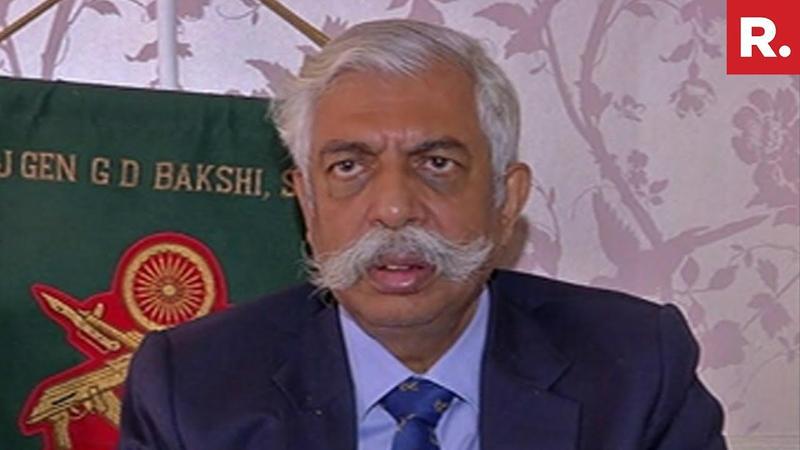Published 20:52 IST, January 30th 2024
Nehru Was Anglophile, Prime Catalyst for India's Freedom was Bose, Says Major General GD Bakshi
Major General GD Bakshi, in an exclusive interaction with Republic, said that former PM Jawaharlal Nehru was an Anglophile.

New Delhi: In a bid to honour the heroes of the Indian National Army (INA), an exhibition on the Red Fort premises currently showcases the remarkable journey of Subhash Chandra Bose and the INA soldiers who paid supreme sacrifice. The exhibition is a tribute to the monumental legacy of the Indian National Army and Netaji’s contributions to the Indian freedom struggle movement.
Aaquil Jameel from Republic Digital, in an exclusive interview with Major General (Retd) GD Bakshi, gained valuable insights as they discussed the profound legacy of Netaji Subhas Chandra Bose. Major General Bakshi stressed that Netaji and the Indian National Army (INA) played a pivotal role in dismantling complete loyalty to the British Raj.
While commenting on the 'distorted and obfuscated' facts by the historians on Netaji, Maj Gen Bakshi said, “The declassified ‘transfer of power’ documents revealed that in December 1945, Commander of British India, Field Marshal Lackin Lee wrote to the Viceroy Lord Wavell saying if the Indian troops as a whole were to be reliable, the British troops were not likely to control the internal situation."
He added, "To regain control of the situation and to restore the essential communication within the country, a reorganised campaign will be needed. The way Americans flew out of Afghanistan while their troops were holding the perimeter, similarly, the British were in such panic that they wanted to fly out of India because they knew if there will be a revolt they couldn’t just hold the line."
Further commenting on this, Maj Gen added, “They have drawn evacuation plan called Operation Gondola. That was the time when Field Marshal Auckinley had recommended to the Viceroy Lord Wavell that unless we announce we are handing over power, I can’t hold.”
On 18 February 1946, there was a revolt in the Royal Indian Navy, where out of 80 sailor ships, 79 brought down the Union Jack and brought up the Tri-Color. And then the Secretary of State for India Frederick Pethick was sent to India for negotiations.
While reiterating the distorted version of history, GD Bakshi said, “The pity is, instead of handing over the power to the INA, Britishers handed over the power to an Anglophile who had supported the Raj against the INA. Jawaharlal Nehru was an Anglophile and therefore they distorted the whole of history and we only see the history, the way they presented to us.”
While commenting on the purpose of Netaji’s exhibition on Red Fort premises and demand for the INA war memorial, GD Bakshi said, “The Indian people have thrown out the King George V statue at the India Gate as they saw it as an insult from the British Raj era. We were very gratified when PM Modi installed a 28-feet tall statue of Netaji weighing 80-tonnes. It has mainstreamed Netaji and the INA to correct the distorted historical narrative."
He continued, "This is an earnest appeal to Prime Minister Modi and the Government of India to complete this historical process under the India Gate. There used to be Amar Jawan Jyoti for 50 years where tribute to the armed forces were paid and then the incumbent government built a National War Memorial. The flame was respectfully shifted from there and brought to the National War Memorial. Right now at the India Gate, the place is lying vacant. It is my earnest appeal to the PM to complete the historical process by building a war memorial for the 26,000 matyred of the INA.”
Reacting to the legacy of INA soldiers who sacrificed their life for India’s freedom struggle, Bakshi said, “INA had a strength of 60,000, out of which 26,000 laid down their lives. Do you call such a struggle non-violent? It is an insult to the memory of those martyrs. Those martyrs haven’t got their due even after Independence. Netaji had constructed a war memorial in Singapore for the INA during the closing stages of WW2. When the war was over by August 1945, Lord Mountbatten and Jawaharlal Nehru had visited Singapore. The people of Indian origin had requested Nehru to go and wreath war memorial of the INA. Nehru agreed to it and then got a call from Lord Mountbatten."
Bakshi added, "He (Mountbatten) instructed him saying, Jawahar you’ll not go and then the former sent the Army engineers to wire up that monument and blow it to smithereens. Even the enemies' monument you don’t blast.”
Commenting on the campaign by the Army veterans for their genuine demand for a memorial in the name of the INA, Bakshi concluded, “In 1995, people from the Indian origin in Singapore paid from their pockets to rebuild the monument. Why don’t we have a monument in India even 75 years after Independence? Let’s give peace to those departed souls. My submission is that let us build the war memorial for the INA under the India Gate where the Amar Jawan Jyoti used to be."
Updated 20:53 IST, January 30th 2024




